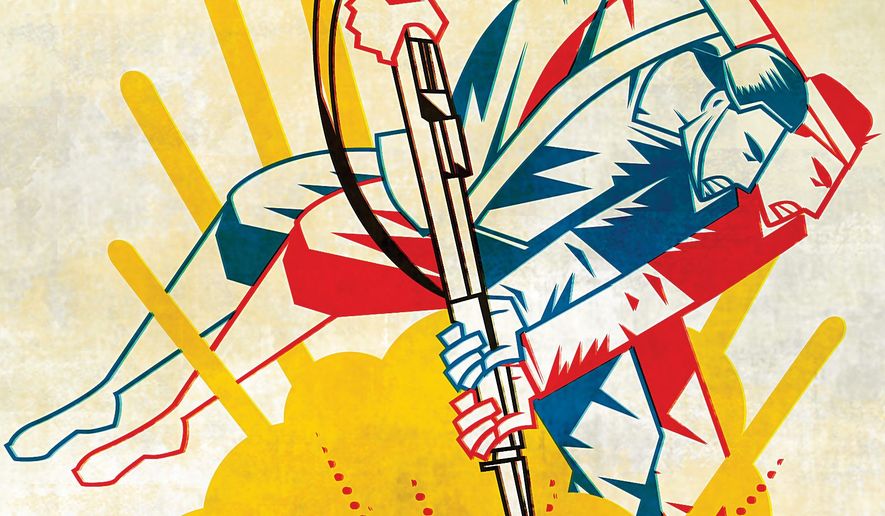OPINION:
May 9 is celebrated as Victory Day in Russia, commemorating that nation’s role in and victory over Nazi Germany in World War II. Traditionally, since the Soviet era, the observance has included a Moscow parade of arms, heavy equipment and troops in a demonstration of military might to Russia’s people and the world.
A year ago another Victory Day parade began that is likely to become a still more enduring tradition, the so-called “March of the Immortal Regiment,” in which ordinary citizens carry photographs of their own family heroes from World War II: fathers, grandfathers, mothers and grandmothers who fought on the front or worked at defense positions behind lines. These processions, which are held in towns across Russia, tap into a nationwide wellspring of emotion and pay tribute to the fact that practically every family in the country lost members to the war effort.
This extraordinary sense of loss from war is something that sets Russian consciousness apart and, at times, makes it difficult to recall that Russians and Americans were allies in that epochal war. The 40 years of the Cold War made many on both sides forget that the United States and Russia fought together to rid the world of Adolf Hitler’s Nazis. It is a partnership that should not be forgotten.
Russian President Vladimir Putin harked back to our World War II alliance when he spoke before the United Nations General Assembly last fall and called for a new U.S.-Russian joint effort to lead a multinational effort to defeat the Islamic State. That hasn’t happened yet, but common sense dictates that we seek ways to engage with one another in a spirit of equality and mutual respect. At this point, only Donald Trump among those seeking the U.S. presidency has been willing to suggest that our failure to go forward together is traceable not just to Moscow, but to the failure of leadership in Washington as well as the fact that U.S. — Russia relations are now in the worst shape since the 1960s.
Mr. Trump tells us that since Ronald Reagan left office, “our foreign policy began to make less and less sense. Logic was replaced with foolishness and arrogance, which ended in one foreign policy disaster after another.” As a result, the entire world, not just the United States and Russia, are less secure today than 25 years ago.
From Moscow’s perspective, former President Bill Clinton’s decision to expand NATO into Eastern Europe was seen as an aggressive anti-Russian mistake. At a stroke this move squandered the unique and short-lived window of opportunity to integrate Russia with the West. Nineteen U.S. senators, Secretary of Defense Les Aspin, as well as Gen. John Shalikashvili, the supreme allied commander in Europe at the time, all opposed NATO expansion. The legendary diplomat George Kennan called it a “strategic blunder of potentially epic proportions.” The late Sen. Daniel Patrick Moynihan worried that it might set the world on a dangerous road to a future nuclear war.
As President, George W. Bush continued advocating NATO expansion and launched a democracy promotion crusade that those against whom it was targeted saw as an attempt to pressure them to adopt a form of governance that works well in the United States, but in many instances was unsuited to others. These were, of course, the same advisers who advocated the invasion of Iraq, which cost the United States trillions of dollars and the lives of many Americans and Iraqis, and began the unraveling of the entire Middle East and the rise of the Islamic State.
While the election of Barack Obama began with promising rhetoric, his administration continued the policies he had inherited, embraced “regime change” that resulted in new disasters in Libya, Syria and Yemen while exacerbating the tensions in Ukraine and an ongoing confrontation with Russia that could have been avoided.
International tensions and even war are more often than not the culmination of mistakes drawn up and championed by politicians with little comprehension of how they will be viewed by others. The United States and Russia are different in many ways and our different ways of seeing the world are a product of our distinct histories and the neighborhoods in which we live.
There are, however, also many ways in which we are alike. Our peoples hope and pray that we will never again face another world war that costs so much in blood, treasure and lost opportunities. The threats we face today trouble leaders in Moscow and in Washington who should remember as we celebrate our World War II partnership what we have been able to accomplish when we’ve worked together.
• Gilbert Doctorow is the European coordinator of the American Committee for East-West Accord. Edward Lozansky is the president of the American University in Moscow.




Please read our comment policy before commenting.